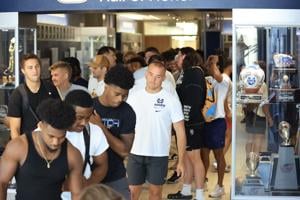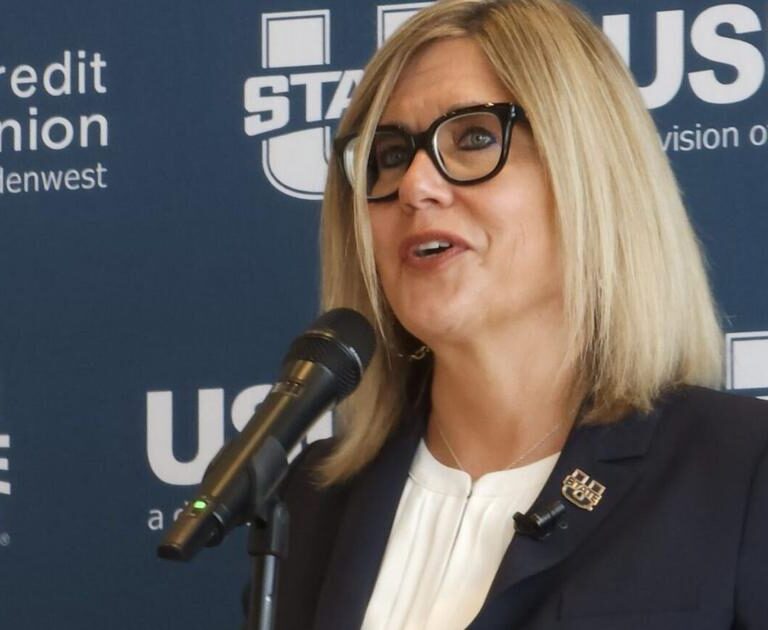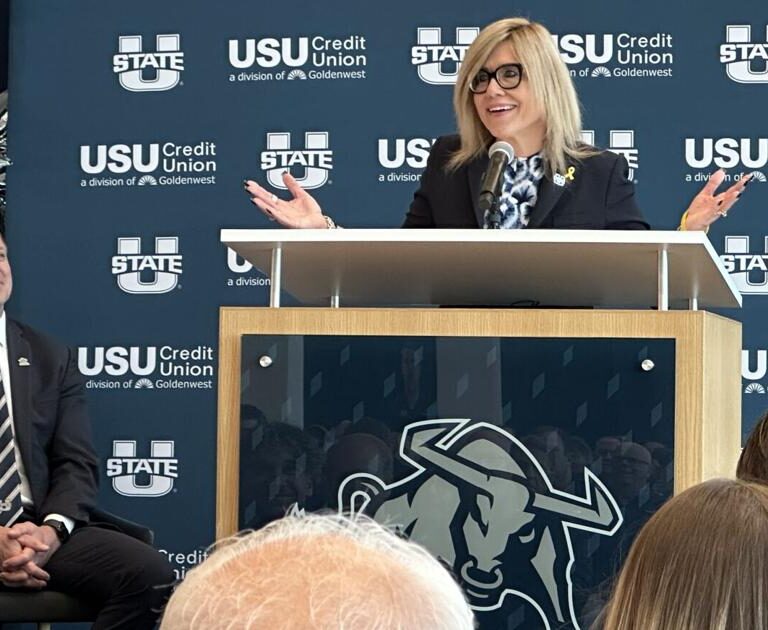
WELLSVILLE – With the final whistle from the center referee the members of Tsunami, a girls soccer team in the Northern Utah United soccer organization, began a dejected walk off the field as their opponents celebrated victory which made them regional champions. Aside from the pain of losing in the regional championship game, the loss meant two more things.
For one, it shattered hopes of an appearance at nationals in North Carolina where they could face the best of the best. And secondly, it heralded the end of the line for many girls on the team. They’d spent years playing with each other under the tutelage of their coach, Ray Larsen, from whom they’d learned lessons both on and off the field. But graduation from high school was quickly approaching for several girls, and those who were reaching that benchmark would be moving on, never to play for Tsunami again.
“It was miserable,” said Liv Brenchley, one of the players on the team. “Everybody was bawling. We were so disappointed because we knew that we had one more chance to play together. And we lost.”
As it turned out, Tsunami would get another chance before a breakup. The team they lost to couldn’t actually make it to the North Carolina nationals and so forfeited their spot to Tsunami. The run was still on, for now. But even as the emotional 180 took effect, with tears drying up and frowns turning back into smiles, the feeling of it all being over — though gone for now — lingered in memory. A true ending would one day come. Not just for those moving on in 2022, but those who would leave after the 2023 season as well.
“Be there first. Commit without fear”
In 2008, Larsen led the founding of Tsunami, starting with his daughter’s Wellsville rec league team. At the time, the girls were just six years old. Three years later, another of Larsen’s daughters had entered the soccer world and her rec team was eyeing a jump from being just a rec league team to becoming a club team. One of the parents volunteered Larsen’s name as a coach, citing his experience coaching the first Tsunami team. And despite still being the coach of Tsunami and owning a construction company, Larsen accepted the responsibility.
Two years into this duel-coaching experiment, the popularity of the team had continued to grow and a third team was added. Though this time it was Cade Brenchley who was brought on to coach after Larsen asked for him to help. Brenchley had known Larsen since high school but had recently moved back to Cache Valley with his daughter having initially played for another soccer club. But Brenchley and his daughter wound up with Tsunami.
Larsen, in his role as founder and coach, developed into a crucial figure in the lives of the girls he coached. He planted his flag in youth soccer and used it to try and better the lives of those around him.
“For all of us girls Ray has been a second dad, he knows about our families our boyfriends and everything in between,” said Andie Andrus, another player on the team. “He is always the person to reach out and help.”
“He loves the game and he loves these girls,” Cade Brenchley said. “He says it’s not always about winning in the game of soccer. It’s about the experience.”
“When tryouts came around every year and there were girls whose teams had just dissolved and they had nowhere to go, Ray always picked them up and gave them a place,” Liv Brenchley said. “He always says that if a girl wants to play soccer they deserve to be able to play soccer.”
Larsen built a teaching philosophy that included numerous team mottos. Things like being “Above the Line,” or “Be there first. Commit without fear” and “What’s your dream? Let’s chase it!” Among the many life lessons, Larsen also made sure to have his team give back to the community. Over the course of a decade, the team ran a fundraiser each December that raised $125,000 that went not to the team’s own expenses, but to help families going through difficulties.
“What’s your dream? Let’s chase it!”
At the start, and for much of its existence, Tsunami was an independent group of teams functioning outside of the other organizations like NUU, which runs roughly 100 teams with 1,500 kids under their umbrella as the largest youth soccer club in Cache Valley. That came with numerous challenges. The Utah Youth Soccer Association kept making changes that made being an independent team more and more difficult. Though one of the signature challenges Tsunami faced came not from the UYSA, but simply finding a place to play soccer.
A plot of land was found for the team to play on, offered as a temporary measure, but it was just barely large enough to paint a field onto. It also had rocks, unlevel spots, lacked a sprinkler system and had unwanted features like an old shed. So club members began developing the land into a home they could be proud of. They took down the shed, moved the rocks, leveled the ground, installed a springling system, and even planted new grass on parts of the field.
With great effort and continuing maintenance of fertilizing, mowing, watering the field, and chasing away the voles Tsunami was on its way to having a home. But, in keeping with the ever-present challenges of being an independent club, the hard work came too little. The temporary offer to use the field got revoked just as the field began to reach its full potential as a soccer venue, and Tsunami had to once again find a new place to play.
These challenges continued to stack and weigh upon Tsunami leadership. Giving up their independent status and joining one of the club organizations seemed to be the only option. But there were hang-ups. The biggest one would be giving up their identity. Being Tsunami was who they were.
“It was kind of our identity and culture,” Cade Brenchley said. “We were such a close-knit group. The girls were like, I don’t want to be NUU. Let’s stay independent. We were on the fence. And it wasn’t anything against NUU, it was just losing that – we wanted to stick together.”
Leaving behind the Tsunami identity also came with a monetary cost. The team had purchased some fairly pricy jerseys, coming in at about $200 a kit.
But eventually, the fight to stay independent became too much to be worth it. But NUU and its president, Chris Guymon, didn’t walk in and do a hostile takeover. In fact, they presented a perfect compromise: Keep the Tsunami name and identity until the girls on the teams graduate. That was something that to the players and coaches meant a lot.
“They allowed us our autonomy. More so than if we were a younger team,” Brenchley said. “And we’re grateful for that, big time.”
“Above the line”
While Tsunami showed its commitment off the field, both to keeping the team afloat and preserving their identity as a team, the on-field commitment was just as intense. Larsen ensured his players were drilled in even the most simple skills of the game, and he started that process early.
“One thing that we as a team have worked on since we were eight years old is just possessing the ball and keeping the ball and not forcing bad shots, not forcing bad passes,” Andrus said.
The dividends of this discipline came in not-so-obvious accomplishments, like completing 300 passes in a single half during one game, but also in general team success. Tsunami finished as champions of numerous tournaments, including the Rage Cup, Cache Cup, Real Cup, Coyote Cup, President’s Cup, and Phoenix Cup. They were also finalists in the Nomads, Dean Cook and Memorial Shootout tournaments. And that regional final they lost but also won by forfeit? Tsunami would go on to North Carolina and place third in the National President’s Cup tournament.
Individually, the on-field commitment paid off. Early in March, eight Tsunami players — along with parents, friends, siblings and coaches — gathered at the Hansen Sport Complex. Together, they signed letters of intent to play for various colleges where they will be continuing their soccer ambitions. Kaylinn Gallup, Brittney Egbert, Macy Sickler, Anna McBride and Hailey Anderson will all be playing for Casper College. Andie Andrus and Emily Chambers will both be at USU Eastern. Liv Brenchley will be playing at College of Idaho and Ashley Farar-Chandler will be attending Gilbert Community College.
In all, at least a dozen players that played for Tsunami have or will go on to play collegiate soccer.
“You have your whole life to work”
With the graduation of all these players, the run for Tsunami has officially reached its close. The team will fully assimilate into NUU with no players donning the Tsunami jersey and simply falling under the team names NUU uses.
“It’s definitely weird, because it doesn’t feel real,” Andrus said. “My entire life that I can remember has literally evolved around this team. It’s been what I look forward to all day at school. It’s what I look forward to in the summertime, going to tournaments. So it ending is like the end of an era. Like starting a whole new life. It’s kind of scary.”
“It’s been a lot of fun,” Cade Brenchley said. “It’s kind of sad that this is coming to the end. But it’s been fun to watch them.”
Along with the joy of watching these girls play, Brenchley, Larsen, and all of the parents who provided their unwavering support will enjoy the connections built for years to come. Some of those connections have already come to fruit in small ways. Several players that had already moved on from Tsunami returned to the team to volunteer, or even coach the players. Most have kept in touch one way or another.
“We’re always getting wedding notifications,” Brenchley said.
Larsen would often tell his players “You have your whole life to work” whenever he heard they’d missed practice because of their job. Now, for most of the girls, their “whole life” is ahead of them. And they’ll always have Tsunami behind them to help them ride the waves of life.






